 Petzlover
Petzlover Catalan Sheepdog is originated from Spain but Rafeiro do Alentejo is originated from Portugal. Catalan Sheepdog may grow 20 cm / 7 inches shorter than Rafeiro do Alentejo. Catalan Sheepdog may weigh 35 kg / 77 pounds lesser than Rafeiro do Alentejo. Both Catalan Sheepdog and Rafeiro do Alentejo has almost same life span. Catalan Sheepdog may have less litter size than Rafeiro do Alentejo. Both Catalan Sheepdog and Rafeiro do Alentejo requires Moderate Maintenance.
Catalan Sheepdog is originated from Spain but Rafeiro do Alentejo is originated from Portugal. Catalan Sheepdog may grow 20 cm / 7 inches shorter than Rafeiro do Alentejo. Catalan Sheepdog may weigh 35 kg / 77 pounds lesser than Rafeiro do Alentejo. Both Catalan Sheepdog and Rafeiro do Alentejo has almost same life span. Catalan Sheepdog may have less litter size than Rafeiro do Alentejo. Both Catalan Sheepdog and Rafeiro do Alentejo requires Moderate Maintenance.
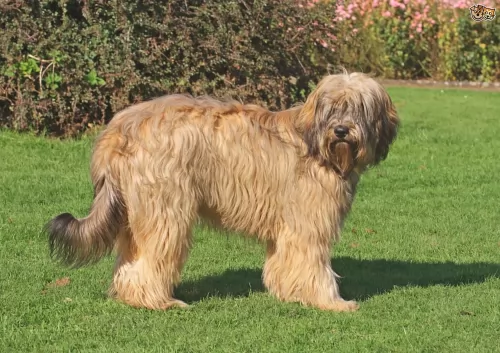 The Catalan Sheepdog, known also as the Gos d’Atura, hails from Catalonia, Spain. It is believed that the dog is related to the Portuguese- and Pyrenean Sheepdogs.
The Catalan Sheepdog, known also as the Gos d’Atura, hails from Catalonia, Spain. It is believed that the dog is related to the Portuguese- and Pyrenean Sheepdogs.
The standard for this breed was formulated in 1929. The sheepdog developed during Roman Empire times between 200 and 100 BC already, being used as livestock guard dogs. With the breed dwindling in the 1970s, Catalonian Sheepdog lovers started promoting it, but it remains a rare breed.
 Known also as the Portuguese Mastiff, the Rafeiro do Alentejo comes from Portugal and has always been used as guardian for livestock. Their numbers declined quite a bit when there was no longer a need for this kind of job.Today it is essentially a companion dog.
Known also as the Portuguese Mastiff, the Rafeiro do Alentejo comes from Portugal and has always been used as guardian for livestock. Their numbers declined quite a bit when there was no longer a need for this kind of job.Today it is essentially a companion dog.
The official standard of the Rafeiro do Alentejo was established in 1953. The dog is is recognized as a breed by the Portuguese Caniculture Club as well as the Federation Cynologique Interationale.
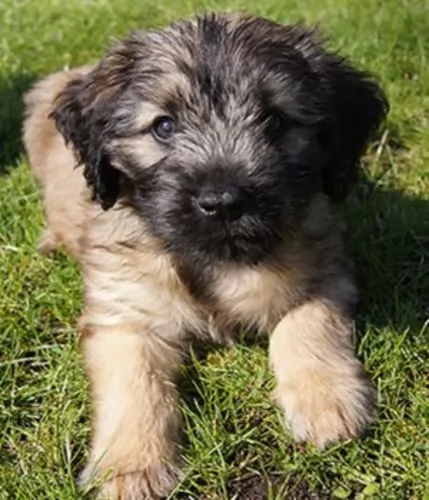 The Catalan is a medium sized dog but gives the impression of being bigger than he actually is. He stands from 45 – 55cm in height and weighs between 20 to 25kg.
The Catalan is a medium sized dog but gives the impression of being bigger than he actually is. He stands from 45 – 55cm in height and weighs between 20 to 25kg.
This breed also has double dew claws on the hind feet. He has a long coat which is slightly wavy and available in different shades such as fawn to brownish to dark grey to black. He has floppy, feathery ears and a fairly long, feathery tail. He has quite a bit of hair on he face too, so you’ll notice a beard, moustache as well as hair which covers the eyes somewhat.
Brave and courageous, the Catalan Sheepdog is also intelligent, active and hardy. He has a round face with a friendly, amicable expression. He is totally pleasant and sweet natured. However, in his role as guardian of sheep he took his role seriously, forming a strong relationship with both shepherd and sheep.
He is wary of strangers. Early socialization and training is always important, and while he makes a wonderful family pet, this training and socialization makes him more relaxed and obedient and he gets on well with children in the home as well as with other pets. While he is a placid, docile and gentle pet, he is also looked upon as a protector, and will defend his family.
 The Alentejo is a large dog standing at between 64 and 75cm in height and weighing 45 to 60kg. He is a powerful dog with a deep chest, dark eyes, floppy ears. His coat is short to medium length, thick and straight. The color of the coat is a mix of fawn, a wolf grey, white, cream and black.
The Alentejo is a large dog standing at between 64 and 75cm in height and weighing 45 to 60kg. He is a powerful dog with a deep chest, dark eyes, floppy ears. His coat is short to medium length, thick and straight. The color of the coat is a mix of fawn, a wolf grey, white, cream and black.
This is a serious dog with a calm demeanour about him. It doesn’t matter how calm he is though, as every dog will require training ad socialization if you want to enjoy having an obedient, well mannered dog around you. This is particularly important with a large, independent, self-confident, territorial dog like this.
He isn’t an aggressive dog but he is protective, wanting to guard and look out for his human family. They are dogs that get on well with children and other pets in the home, being wary of strangers.
They’re not recommended for life in small properties in the city as he requires a large garden at least.
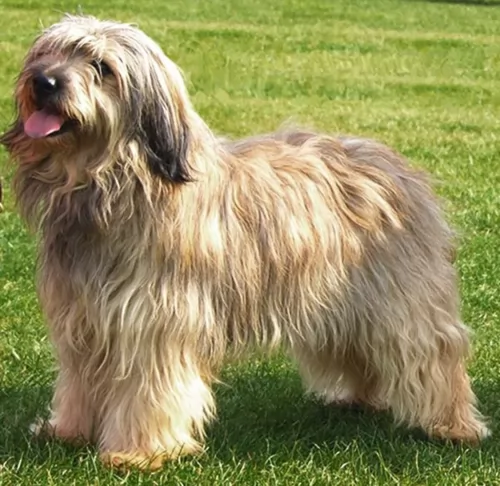 The Catalan Sheepdog is such an amicable character – he is going to make an awesome pet. He is an intelligent and obedient dog and is easily trained.
The Catalan Sheepdog is such an amicable character – he is going to make an awesome pet. He is an intelligent and obedient dog and is easily trained.
He has been used for guarding- and herding work and as a family pet makes a excellent guard dog as well. Capable of being gentle too, he is everything his human family wants him to be and just becomes a regular member of the family.
 The Rafeiro do Alentejo is a quiet dog, but intelligent and strong-willed. Training and socialization will make him easy to get on with.
The Rafeiro do Alentejo is a quiet dog, but intelligent and strong-willed. Training and socialization will make him easy to get on with.
He will become an excellent companion, and can come indoors because he is well mannered and considerate. He was bred to be a guard dog, and the responsibilities he had taking care of livestock has been transferred to looking out for- and protecting his human family.
He makes a wonderful pet and companion, even with children and other pets, more so when brought up correctly by loving, firm, consistent dog owners.
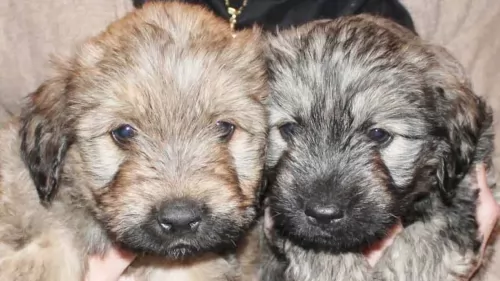 The Catalan Sheepdog is a fairly healthy breed and has a life expectancy of 12, 13 or 14 years. Nonetheless you will still need to watch out with common dog ailments with him, particularly hip dysplasia.
The Catalan Sheepdog is a fairly healthy breed and has a life expectancy of 12, 13 or 14 years. Nonetheless you will still need to watch out with common dog ailments with him, particularly hip dysplasia.
This is a joint and hip disease which can start with symptoms from 6 months of age already. Your dog will be hesitant to play and jump, doesn’t like to go upstairs, tires easily during a walk and develops a hop-like way to walk. You’ll notice that when he lies down, he battles to- or is reluctant to get up again.
X-rays may be required to confirm the diagnosis of hip dysplasia. There are different treatment options, all with the wellbeing of your pet in mind. You don’t want him to have a life of pain and lameness.
 The Rafeiro do Alentejo is a generally healthy dog breed, and with good care can get to 11, 12 or 13 years of age.
The Rafeiro do Alentejo is a generally healthy dog breed, and with good care can get to 11, 12 or 13 years of age.
Of course with a large dog like this, it is always a good idea to be aware of canine hip dysplasia, particularly because this is a large dog with a deep chest.
This makes him also vulnerable to bloat, a condition where the stomach swells with gas and which can be life threatening. Other things to watch for are ear infections and parasites.
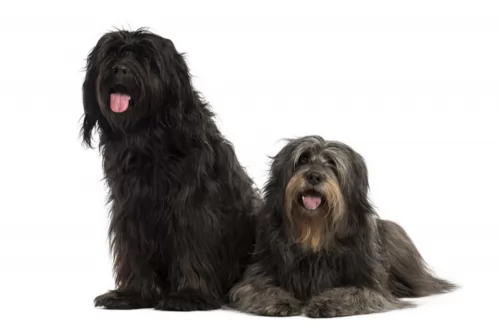 The Catalan Sheepdog is a working breed, so he is going to need plenty of exercise. While he adapts easily to city- or country life, it will be to his benefit to have a garden to romp in. You will still need to take him for walks and play ball- and rope games with him. This will prevent boredom and destructive behavior from him.
The Catalan Sheepdog is a working breed, so he is going to need plenty of exercise. While he adapts easily to city- or country life, it will be to his benefit to have a garden to romp in. You will still need to take him for walks and play ball- and rope games with him. This will prevent boredom and destructive behavior from him.
The Catalan Sheepdog has long hair so he will need to be brushed twice a week to avoid matting. This will help to remove loose hair too, but also distribute natural oils through his coat, keeping his hair and skin healthy and free from skin rashes and itchiness.
This brushing ensures other benefits as you can simultaneously check him for parasites such as fleas and ticks.
If you feed him commercial dog food, make sure its a high quality one. He is an active breed so will require high protein. Give him some homemade rice, vegetables and meat, and include raw meat in his food from time to time too. Always ensure that there is fresh, cool water constantly within reach.
 Make your grooming time with this serious, calm canine friend of yours a special bonding time. His coat simply requires a brush twice a week to keep it healthy and shiny.
Make your grooming time with this serious, calm canine friend of yours a special bonding time. His coat simply requires a brush twice a week to keep it healthy and shiny.
While bushing him, run your hands over him to make sure there aren’t any unusual lumps. Check inside the floppy ears to make sure they’re not red which could be the start of a painful ear infection.
Look a his nails and trim them if they’ve become too long. Check inside his mouth and make sure there aren’t any black, rotten teeth as this can seriously impact the health of your pet.
Options for exercise will include long walks and a chance to run off his leash. In the back yard it will be to his benefit to throw balls for him to fetch. You can even bring him indoors and play some calm games with him. He should have exercise every single day.
Good food is needed for good health. It is always convenient to make use of the commercially manufactured dog foods there are on the market.
You don’t want to feed this to your dog day after day so provide your pet with some tasty home-made food too. Dogs want simplicity and consistency with their diets so they don’t battle with upset stomachs and an unnecessary trip to the vet.
Some home-cooked food twice a week and added to the dry kibble can keep him healthy and happy. Boiled chicken, sweet potatoes, brown rice or pasta, carrots and spinach will be perfect for him. Chop the food up finely and add it into the dry kibble once or twice a week.
Some people even cook it in bulk, refrigerate it and warm up small portions to add to the kibble. Raw meat added in occasionally can also be a good treat. Make sure your pet is never without a constant supply of fresh, cool water.